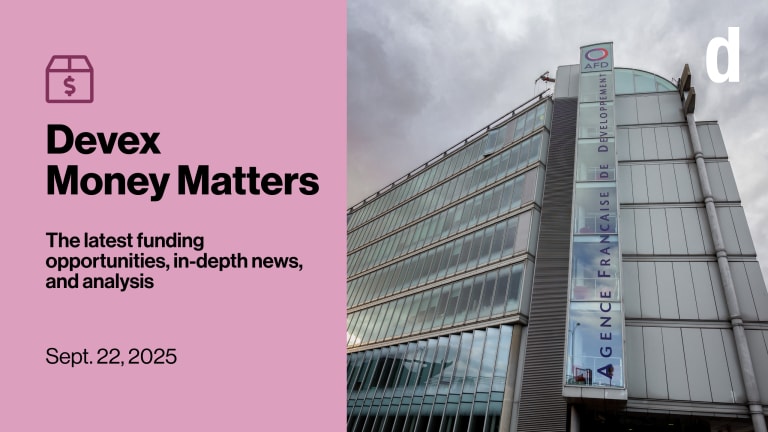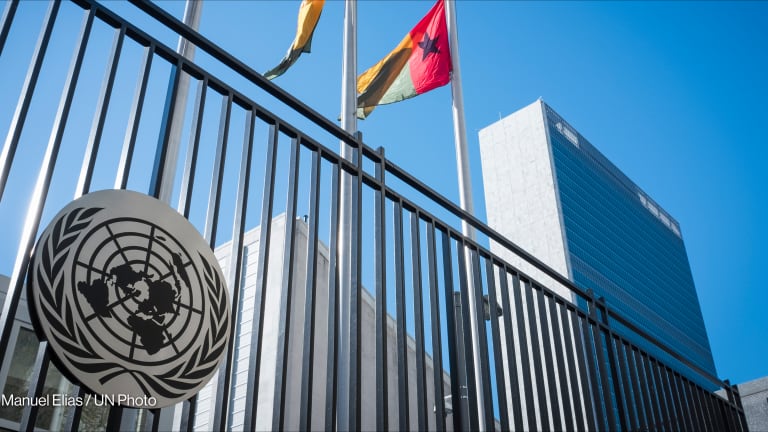
BRUSSELS — More money for least developed countries and avoiding linkages between migration and development spending are among the top concerns for NGOs as the French government’s long-awaited development legislation makes its way through Parliament this year.
“Emmanuel Macron’s campaign promise to program ODA to hit 0.7% of GNI by 2025 has disappeared.”
— Yann Illiaquer, advocacy officer, Coordination SudThe current bill will replace an existing development law from 2014 and plots how the government intends to meet President Emmanuel Macron’s plan to raise French aid to 0.55% of gross national income by 2022 — up from 0.38% in 2016 and 0.43% in 2018.
Yann Illiaquer, advocacy officer at Coordination Sud, a group of NGOs, told Devex that the law’s multiyear projection of ODA spending is a major step for France. However, he lamented that this runs only until 2022, while “Emmanuel Macron’s campaign promise to program ODA to hit 0.7% of GNI by 2025 has disappeared.”
Jean-Baptiste Lemoyne, France’s secretary of state for development, told lawmakers during a debate earlier this month that 0.55% by 2022 is “only a first step, the target being 0.7%.”
The bill will put into law the priorities adopted at a 2018 meeting by the country’s interministerial development committee, which is chaired by the prime minister and sets France’s development agenda. That meeting also set 19 priority countries — which are among the least developed in Africa, plus Haiti — and a focus on the issues of fragility, education, climate, gender equality, and health.
However, members of French civil society told Devex they are troubled by aspects of the government’s current proposal, which they were shown during a meeting of the National Council for Development and International Solidarity on Feb. 18.
Maé Kurkjian, policy and advocacy manager at the ONE Campaign in France, said her organization would be pushing for specific spending targets for the 19 priority countries, designed to boost France’s support for LDCs.
France spent $3.4 billion, or 26%, of its aid on LDCs in 2018, according to figures from OECD, down from 29% 10 years ago and below the current 31% average for wealthy donors.
Migration is another sensitive area, echoing debates throughout the European Union about whether development spending can or should be used to stop illegal migration or be used as a carrot for countries to accept the return of their citizens expelled from Europe in exchange for aid. Marc Le Fur, a center-right member of parliament, said during the recent parliamentary debate that “it is not normal” that French soldiers are being killed in Mali, which receives French aid, while Mali does not cooperate more in taking back migrants from France.
But for Kurkjian, language in the draft bill that frames ODA as “an essential lever” in talks on migration with recipient countries is cause for concern.
“We have compared that language with the bill we had before in 2014, and it is much, much worse,” Kurkjian said. “It used to recognize that migration has a positive impact on development; now it’s just saying we could use ODA for migration purposes, and it explicitly mentions curbing migration flows.”
Kurkjian said NGOs would be pushing for the inclusion of a reference to the European Union’s Lisbon Treaty, which states that the “primary objective” of its development cooperation is the eradication of extreme poverty.
The draft law also sets up an independent commission to scrutinize aid projects, similar to the U.K.’s Independent Commission for Aid Impact. This new body will fall under the authority of France’s Court of Auditors, with two of the court’s officials on the commission, which will also include French and international members chosen on the basis of their skills in evaluation and development. The composition of the independent commission will be established by government decree, once the law is passed.
“You can’t have people who only deal with figures and money evaluating development policy,” Kurkjian said. “We would like people [to sit on the commission] who are impacted by those policies, people who actually see the human side of it, the social impact … all the positive effects that you can’t see in an Excel document.”
The Economic, Social and Environmental Council, a civil society consultative body, will publish its opinion on the legislation Tuesday. According to the current schedule, the final text will be made public March 11, when it is considered by the Council of Ministers, chaired by Macron, before it begins its passage through Parliament.
NGOs say the bill could move quickly, especially given the Africa-France summit in Bordeaux in June.
During the recent debate, Le Fur was among those expressing regret that Parliament is only now scrutinizing the planned spending up until 2022. “One doesn’t set the rules of a match a few minutes before the end,” the deputy said. “We are already in the second half of [Macron’s 2017-2022] term.”
“Of the first term!” his supporters cried.
“That,” Le Fur said, “the French people will decide.”




